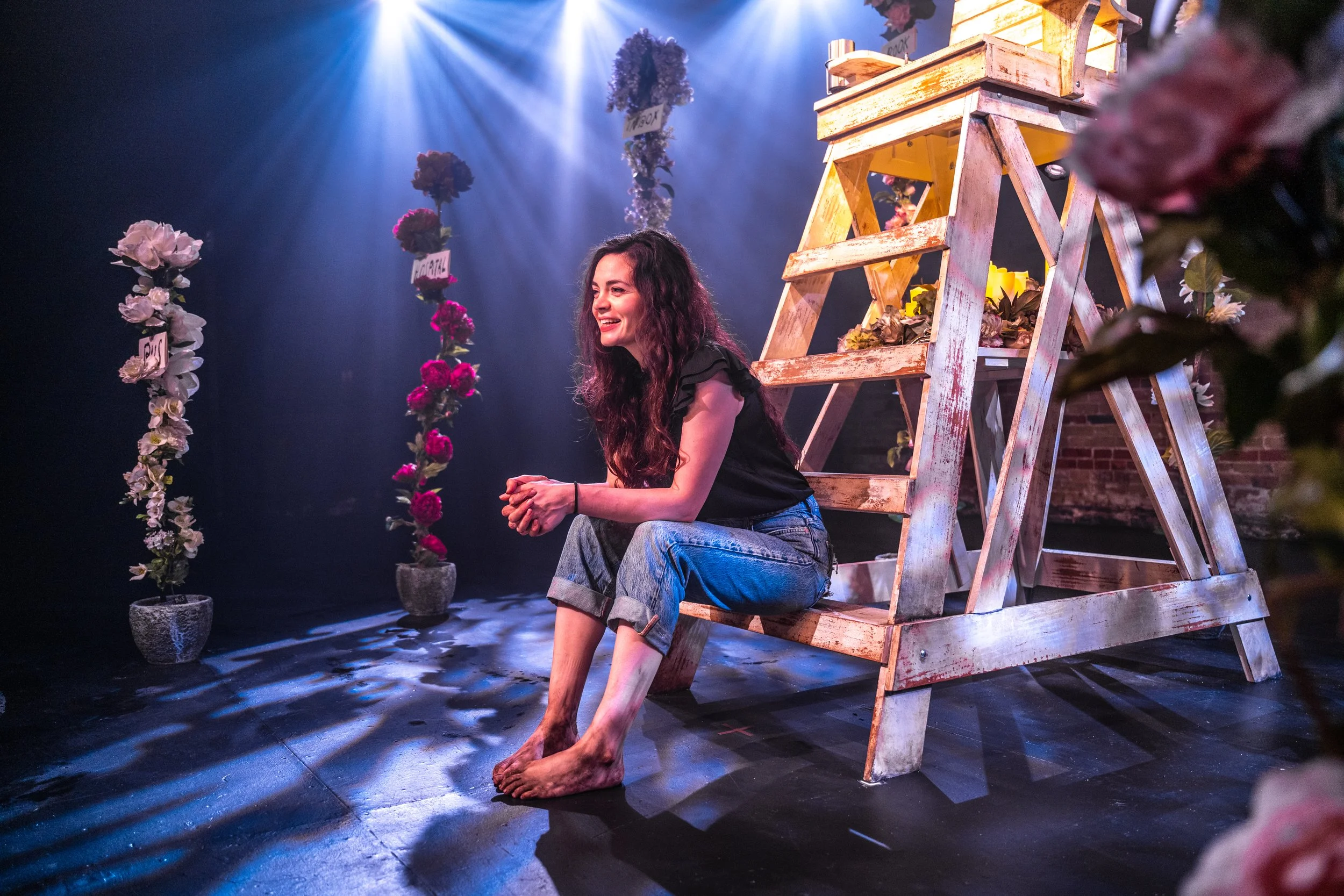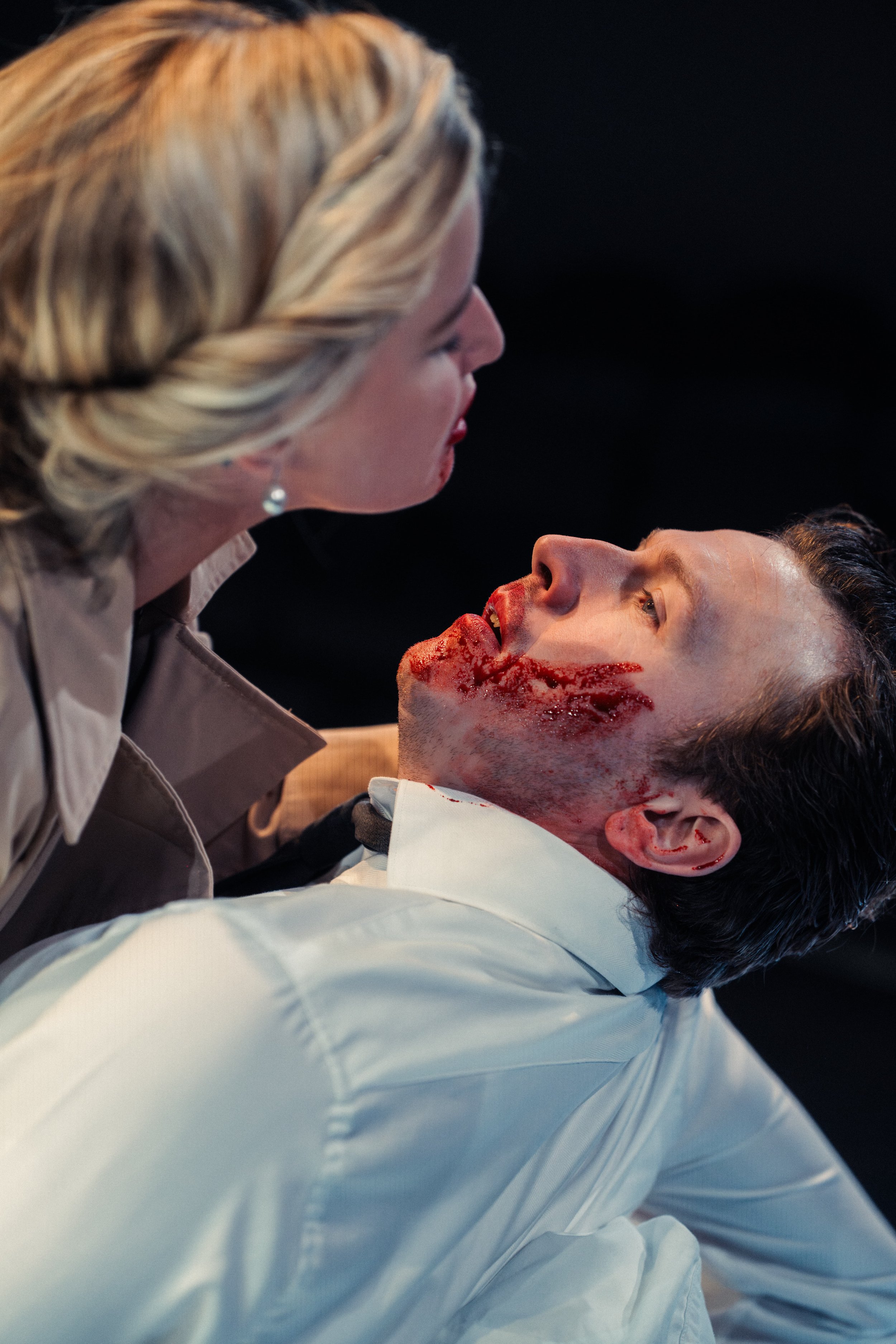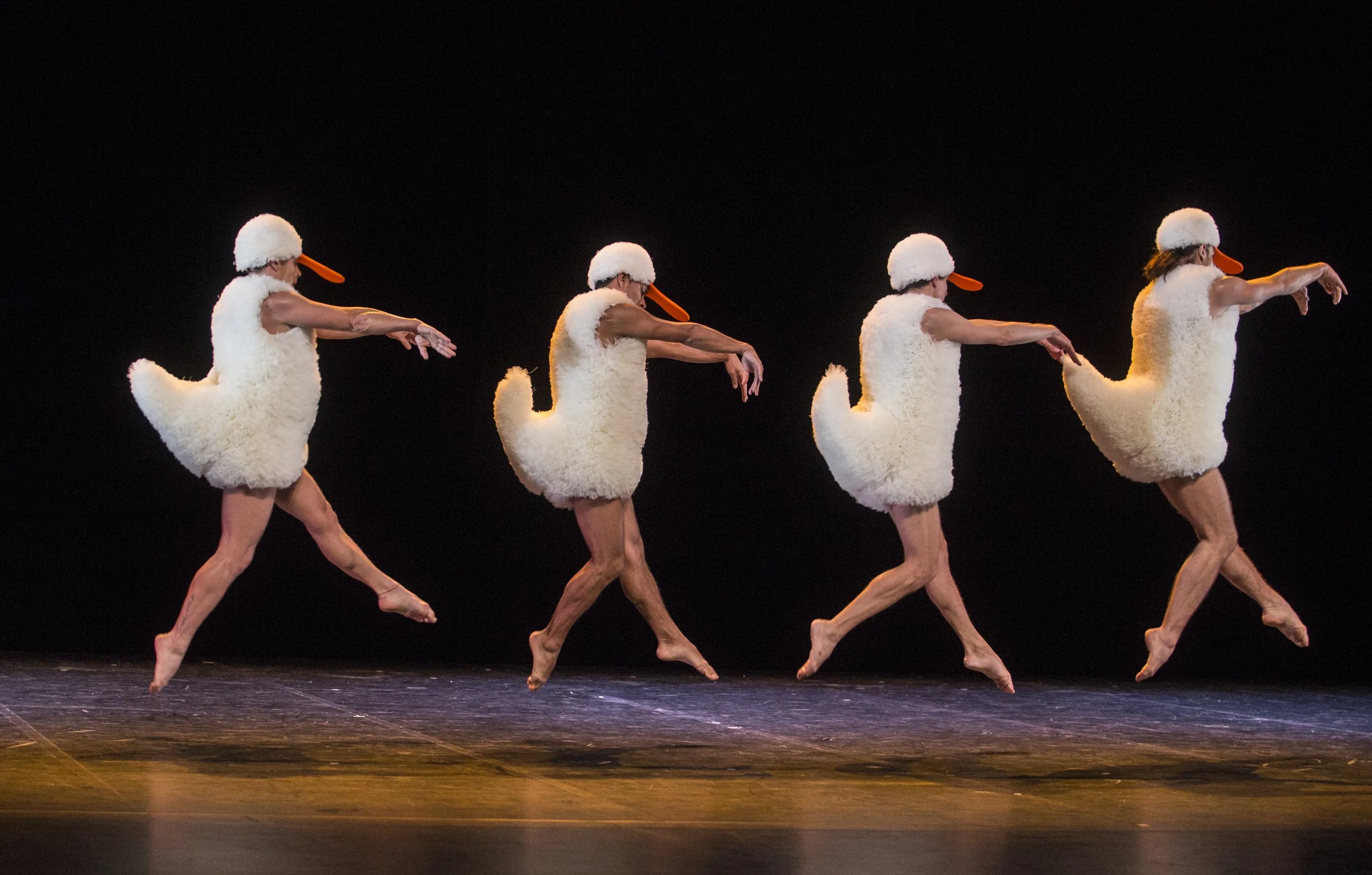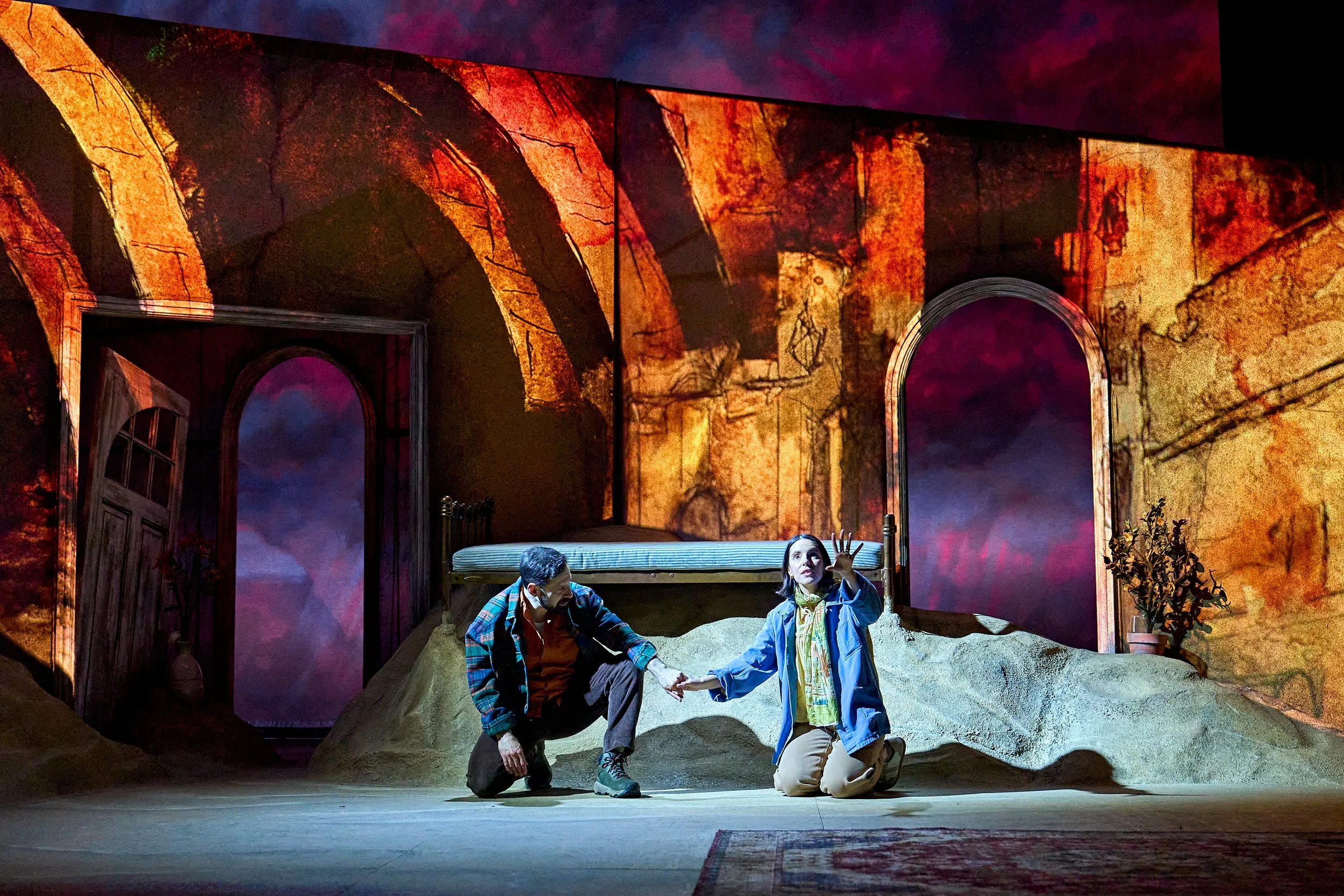The Caretaker, Chichester Festival Theatre Review
Jack Riddiford and Ian McDiarmid in The Caretaker. Photo by Ellie Kurttz.Written by Rosie for Theatre and Tonic.
Disclaimer: Gifted tickets in return for an honest review.
As the heaviness of the air on stage lingers and one of the brothers says to the old man “every word you speak is open to any number of interpretations”, everything that director Justin Audibert and his actors had constructed fell into place. ‘The Caretaker’ (1960) by Harold Pinter is revered to be one of his best and well-loved plays in his catalogue of theatre, a three-person show where dialogue carries us through the core message more-so than action. A seemingly quiet play by nature, the substance of it is anything but. It is a thought-provoking drama which allows the tragedy, but also the surprising humour, to wrap the audience up in the web of lies and manipulation throughout.
The play follows Davies (played by Ian McDiarmid), a homeless stranger who is provided shelter for the night by a timid young man, Aston (played by Adam Gillen), and he leaps at the opportunity to change his fortune when presented with the offer to become the house caretaker. The house, a shoddy, run-down, almost derelict space, is also owned by Aston’s brother, Mick (played by Jack Riddiford) whose short-temper and wild fantasies contrast the simple, quietness of his sibling. In the way a chameleon changes depending on its surroundings, Davies changes his stories in order to gain favour from both brothers, but always tows the line of overstepping his boundaries until it all comes to a dramatic, resolute end.
Under Audibert’s brilliant direction, McDiarmid is given the cluttered space to shine. Delivering Pinter’s lines seems to come so naturally from him, he leads the charge into this play with a perfect balance of manipulation and comedy. It is an exceptional performance that never wavers in energy or feeling. Physicality is a particular strong suit of his, holding the audience and their laughter for lengths of time purely from a strut across the stage or a glance at his surroundings. He captures the line between harmless and almost predatory as if it were as easy as breathing, making the audience almost miss the awful hate he is spewing as he seamlessly fills the air with endless chatter. He was especially brilliant in any scenes shared with Gillen, whose portrayal of Aston was mild and sympathetic, never overplaying his disability to the point of it appearing to be satire. It was a beautiful, respectful, very real portrayal of a character who says so much in his actions even when saying very little out loud. The two together made for some of the strongest scenes of the play, their performances perfectly balancing each other throughout. Gillen’s monologue at the conclusion of the first half allowed for him to really share the strength in his performance, slowly unveiling the true nature of his character’s impediment. On the other end of the character spectrum, Riddiford’s portrayal of Mick was a shocking juxtaposition to his brother. Energetic and imposing, his presence left the audience as apprehensive as Davies upon first contact. A mixture of writing, direction and acting meant that the flow of the show never felt one note. Riddiford did a particularly fantastic job of bringing a very different feel and pace to his scenes which meant it never felt as if the show was just playing one note.
It cannot go amiss to mention the fantastic set designed by Stephen Brimson Lewis, whose filthy, cluttered stage allows for the complete immersion of both characters and audience into the space the story exists in. It is filled with boxes, bottles, cans, carpets, all scattered across the set under a low roof which is falling apart at the seams. It brings the idea of the broken and the unwanted but potentially fixable into the physical as well as the metaphorical. It creates the perfect space for the cast to explore the intricacies of their character’s actions; what they interact with and where things go throughout the play’s runtime often shows more to the audience than the stories told from their mouths. It is a well-crafted and thought-out playground with no prop without a purpose or place, grounding it in its space.
Despite some masterful performances and the beautiful space they take place in, there were a few moments of transition that felt out of place and confusing amongst the drama unfolding. Silent transitional scenes between the days in which Davies is squatting with Aston in Mick’s home were filled with peculiar, unfitting music and were strange to watch. It is awkward amongst the solidness of the preceding scenes, especially with the choice of soundtrack accompanying them walking across the stage or undressing just to redress moments later. It made me wonder whether the creaks and sound effects playing subtly throughout the show would have made for a better backing track to these transitions, inoffensive and consistent in their use to paint a better picture of the shoddy quarters that the three characters exist in. Overall, it felt as though sound was the weakest part of the show’s construction, with moments of dialogue occasionally being lost when actors delivered lines towards the back of the stage or mumbled in a character’s monologue.
All this being said, Justin Audibert’s direction brings an intimacy to Pinter’s work that is only heightened by the masterful performances of McDarmid, Gillen and Riddiford. For many, a straight play (especially from a name such as Pinter’s) may seem daunting, but through the direction of this production, there is an ease of watching that is rarely felt in heavy dramas. Though there are moments of stillness in darker monologues, the production never strays far from the moments of farce and absurdity to balance the story out. As mentioned, “every word you speak is open to any number of interpretations” is a line spoken by Mick in Act Two to Davies and what I consider to be the line that sums up what unfolds within Pinter’s classic. The very human complexities of each character are elevated through the performances and under the direction of Audibert, but allow for the audience to derive their own opinion of who the “caretaker” truly is. Even with peculiar moments of transition between scenes and sometimes drowned dialogue, “The Caretaker” at Chichester Festival Theatre’s Minerva Theatre delivers a fantastic, thought-provoking piece of theatre with three extremely strong performances headed by the incredible Ian McDiarmid, who stunned as the enigmatic Davies. It is a watch that is palatable to straight-play and non-play goers alike, allowing for a myriad of interpretations that will leave the audience talking about the show for long after the final bows.
☆ ☆ ☆ ☆
At Chichester Festival Theatre until 13 July.
THEATRE/PRODUCTION NOTES:
Trigger warnings for this show include: racist language, ableism, mention of mental health and neglect.
No flashing lights are used in this production, but there are moments of extended darkness and a moment of a loud crashing noise in act two.
The Minerva Theatre is a fully accessible space with lift access, accessible toilets on both ground and first floor (where the theatre space is situated), and these toilets have audio-visual assistance for those with visual impairments that may need descriptions of where objects are in the space. CFT’s access scheme is easy to navigate and they offer a wide range of accessibility options to patrons, including but not limited to “Buddies” for those who do not feel comfortable attending the theatre alone, touch tours before certain performances and specific seat descriptions for those who need larger seats or specific requirements.












